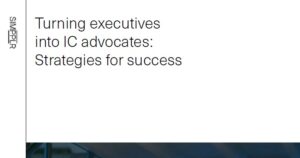What are the key skillsets for internal communicators in 2021 and beyond? 6 comms pros share their views
Here’s what professional communicators should prioritize this year.

The communication profession is at a fascinating crossroads.
More than mere messengers, scribes or mouthpieces, comms pros are trusted advisers, strategy shapers and vision casters. The corporate weight and authority given to the job is rising. So, too, are the skills required.
After the traumas of 2020, communicators are exerting more influence at their companies and forging cultural shifts centered on employee well-being. However, the job increasingly calls for a broad array of skills that range from journalism to psychology and more, including technical aspects of data interpretation.
What will it take for communicators to keep increasing their influence in 2021? Which skills, talents or capabilities will help you advance their careers in what will surely be another tumultuous year?
We sought the views of a variety of expert communicators, who emphasized skills like bridge-building, listening, empathy, patience, and moral clarity. Here’s a deeper look at their views.
Which skills will reign supreme in 2021
Communicators must be savvy bridge-builders in these hyper-partisan times, says Craig Savage, director of communications and external affairs for AUSTAL USA. That entails forging positive connections with media members and local government officials—even if you don’t share their views. He says:
“Personal relationships with government officials will be important in 2021. With a divided nation and emotions running high, media and politicians will continue posturing to support their base. Is that anything new? No. But today’s political and media posturing is unlike anything we’ve seen in the past.”
That posturing shouldn’t affect communicators’ ability to connect with all sides of the aisle, however. Savage continues:
“Businesses require a purple vision to operate and grow. As the old adage goes, all politics is local. At the root, our elected officials want the best for our workforces and their families. Those personal relationships from communicator to elected official are required to cut through the noise in the media, in our communities, and in our break rooms to keep all ambassadors informed and our businesses moving forward.”
Susan DeMory, corporate relations manager for Allstate Insurance Company, says she believes 2021 will be the year of flexibility and empathy—and learning new skills. “The divisive times have redefined the role of the communicator and the skills needed to deliver messaging that resonates,” she says. “If 2020 has taught us anything, it’s that leaders must communicate with empathy, humility and compassion.”
DeMory notes that superb messaging hinges on “agility and adaptability. It’s about being flexible and embracing change as the norm,” she says. “It’s about making a commitment to continuously learn by reflecting on what’s worked well and what hasn’t hit the mark.”
Kathy Green, chief communications officer at The University of Colorado’s Anschutz Medical Campus, cites the importance of patience and recognition. She says:
“In addition to improved listening and overall flexibility, last year made me realize patience is more important than ever as a communications leader. Last year the crises came at communications teams hard and fast, and it often felt as if we were building the road as we were driving on it. We didn’t have much time in our day to day for strategic planning rather than just doing, and for those of us planners, it was certainly a test. Give credit to yourself and your teams for all that you’ve done!”
Karen Eckman, VP of global communications at CSGI, said she believes communicators need to go the extra mile to strengthen relationships and elevate marginalized voices this year:
“Even more than ever, building new or nurturing existing relationships within your organization and/or your professional community will be important,” she says. “We need to consciously make diversity of thought and unique perspectives part of our communications practice.”
Eckman says seeking out diversity of thought “builds trust, fuels ongoing learning and makes communications leaders more valuable. Our organizations will look to us for empathetic and creative counsel to align strategies not just with business needs but with the fluidity of the workplace today.”
This all entails listening. “In response, communicators need to hone their listening skills, have confidence in their ability to simplify the complex and to tell great stories,” Eckman says.
Communicators should be the ones who find common corporate ground, according to Jenny DeVaughn, ADP’s VP of transformation communications. “As the global pandemic continues to transform how people connect, the role of a communicator has become both more difficult and more important than ever,” she says. “Being able to convey your personality and gratitude is critical in forging relationships across a physical divide.”
“Developing that confidence is key, as is the ability to actively listen and empathize with others who have different views or needs,” DeVaughn adds. “We can find common ground, share our stories, take action together and connect in meaningful ways by being authentic and allowing others the space to do the same.”
2021 is also the year of getting real. That might involve confronting ugly ideologies when they’re encountered. It could also entail acknowledging wrongdoings or shortcomings. Whatever the case may be, communicators should be prepared to take a stand.
In the wake of the deadly Capitol riots, Kim Clark, a DE&I expert with Ragan Consulting Group, wrote, “We have and are witnessing the power of language, the power of communication leading to significant behavior and action. We must step up as communicators, examine what is said and not said and ensure we’re leading to desired behavior and actions that foster respect and center on humanity above all else.”
Clark says that the time for performative posts or posturing is gone. 2021 must be about standing with integrity instead of just ignoring bad behavior. “We have to acknowledge and accept that this mindset [of intolerance] is within our orgs, within our leadership. It’s less visible and subtle, and yet still damaging,” she says.
The employee well-being imperative
Beyond improving your craft in 2021—improving your writing, public speaking, graphic design, video, podcasting skills and such—strive to up soft skills, too. Become a better listener. Take intentional step to strengthen your emotional intelligence and resilience. Focus especially on supporting mental health in 2021.
Communicators can support employee wellness by:
- Reframing the value of self-care.
- Building time for self-care into each day.
- Getting enough sleep to help cultivate resilience and better manage emotions.
- Managing digital consumption.
- Cultivating kindness.
If you have no framework by which to measure or gauge such things, here are 13 factors that affect mental health at every company.
- Organizational culture
- Psychological and social support
- Clear leadership and expectations
- Civility and respect
- Psychological demands
- Growth and development
- Recognition and rewards
- Involvement and influence
- Workload management
- Engagement
- Balance
- Psychological protection
- Protection of physical safety
Over to you, communicators. Which skills are you prioritizing in 2021?








“See it and say it” may be a guiding objective. We have to SEE the social value of our organizations and then SAY positively what the good things are.
The goodness we see could seem obvious but as Shakespeare had Marc Antony say, “The evil men do lives after them but the good is oft interred with the bones.” Our organizations’ good points that may seem obvious to us may be more recognized by our readers if we not only see but say.
In Medpage Today, a newsletter for medical professionals, a provocative item asks whether doctors should be willing to treat even a dictator. One comment suggests that even bad guys politically may be good for protecting the public against hunger, disease and crime. And that doctors may be better at treating the sick than at evaluating who deserves treatment .
In the same way since all organizations are sometimes criticized, internal communicators may be especially valuable–to their organizations and to readers alike–when focusing attention (without bringing up the criticism) on the good that organizations do, good that internal communicators can help readers to be glad about.
When you look back over your life,” the Medpage Today comment asks, “will you be more proud of your patients cured or patients rejected?”